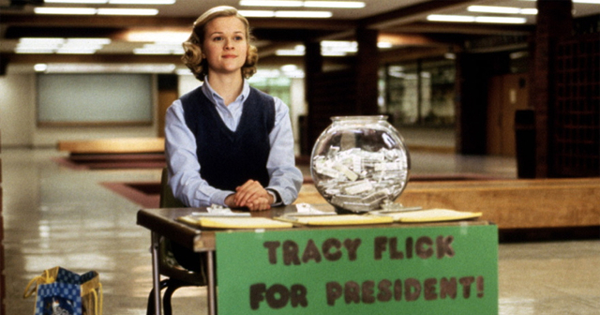
When I was in junior high school, I was greatly amused by the speeches made by candidates for student council. One student promised longer recesses and chocolate milk in the cafeteria; another promised Mountain Dew and other soda choices made available in the water fountains. One candidate, who knew he likely wasn’t going to win anyway, promised that teachers would also be subject to corporal punishment, complete with that infamous paddle with the holes drilled in it and student witnesses (this was North Carolina after all, a place I am sad to report still allows paddling on occasion). The election speeches made for an exciting day, to say the least. First of all, we enjoyed the humor in those ridiculous promises. And the process wasted an enormous amount of time when we otherwise would have been reading or writing or solving math problems or performing science experiments.
As an adult, I still enjoy the ridiculous humor that often comes out of elections; who wouldn’t? The comedy writers can basically go on vacation and just play off the day’s news. I no longer enjoy the amount of time, however, that gets eaten up by it all and I certainly don’t appreciate the huge sums of money that get funneled into such displays. So I have an idea. It’s one I have been hatching for several elections now. Here is what I think would be the proper way to have an election: Each candidate must report to a designated school on a given morning, then proceed into his or her own classroom with only a blue book and two sharpened number two pencils with erasers. Each will be thoroughly searched—no crib notes allowed—and a monitor will be assigned to ensure no cheating: the candidate’s only resource is his or her brain. They will then have four hours to write out their platform—their beliefs and ideals and what they hope to accomplish when elected. At 8:00 A.M. the voice on the PA system will instruct them to begin and at noon will say that time is up.
Then each candidate’s statement will be published just as it appears in all newspapers across the country. The statements will also be read aloud by unbiased parties on the radio and television at appointed times. Period. And then we the public have the responsibility of reading and listening and deciding if we really think it is possible to run Mountain Dew into the water coolers; should we really change the national anthem to something with more of a Bro Country flair? Do we really think that freedom of speech and separation of church and state are good causes and worth our vote? Then we vote, and all the millions of dollars that would have been spent on dinners and nasty commercials and flights from here to yonder and back and all those red and blue ties and pantsuits and haircuts and hotels, and so forth, could go right into, say, the public school system, where there is barely a trickle of water coming out of those fountains, and to food, shelter, and health care for the poor and elderly, leading to liberty and justice for all.

